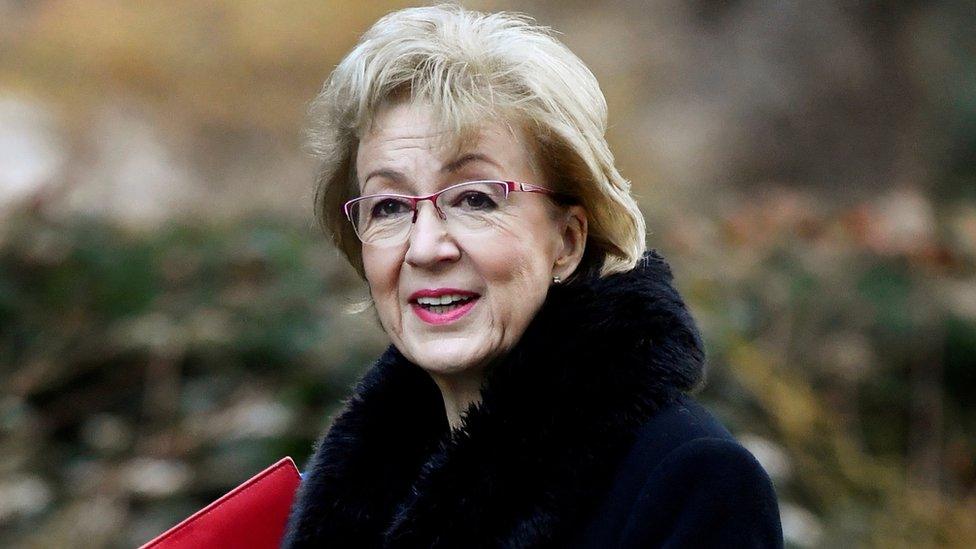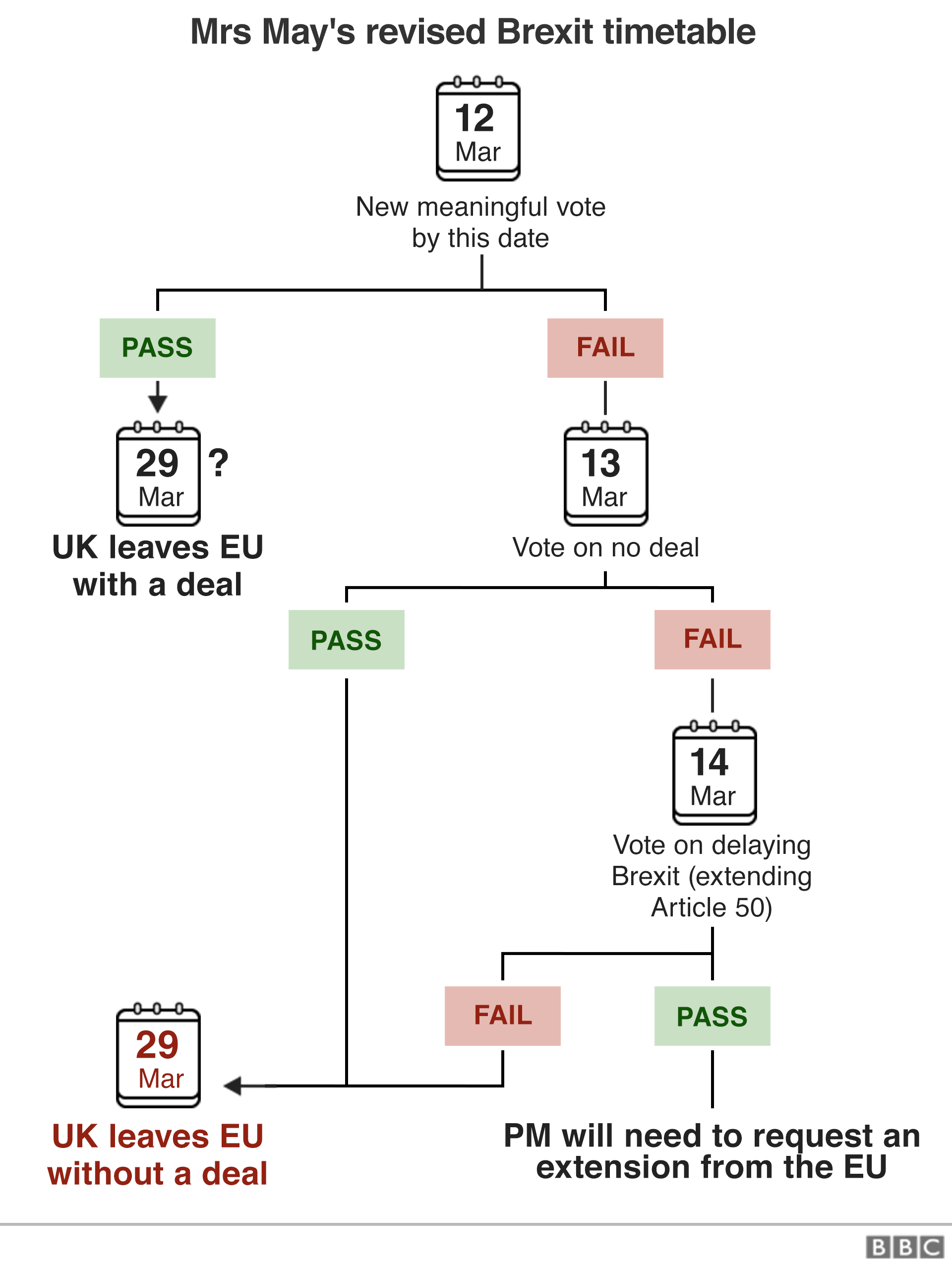Brexit: We will not back deal which breaks up UK - Leadsom
- Published

Commons Leader Andrea Leadsom is "deeply disappointed" by the EU proposal
The government will not sign up to a Brexit agreement that breaks up the UK, Commons Leader Andrea Leadsom has said.
EU chief negotiator Michel Barnier said on Friday that the UK would be free to leave a proposed single customs territory with the EU - provided Northern Ireland remained within it.
The DUP - the party Theresa May relies on for a majority in Parliament - has rejected the proposal.
The plan is designed to avoid physical checks on the Irish border.
The UK is due to leave on 29 March, although Parliament has yet to agree the terms of withdrawal.
The UK and the EU remain at loggerheads over the contentious issue of the Irish backstop - which is designed to maintain an open border on the island of Ireland by keeping the UK aligned with EU customs rules until the two sides' future relationship is agreed or alternative arrangements are worked out.
The Commons Northern Ireland Affairs Committee has suggested there may be a possible technical solution to the border problem "but only if there is trust and goodwill".
On Friday the EU said it was prepared to include a number of existing commitments relating to the application of the backstop in a legally-binding document.
In a series of tweets, external Mr Barnier said the UK would not be forced into a customs union against its will through the Northern Ireland backstop.
He said it would be able to exit the single customs territory unilaterally if it chose to do so.
But, he added, Northern Ireland would remain part of the EU's customs territory, subject to many of its rules and regulations.
Mrs Leadsom said she was "deeply disappointed" by the proposal.
She told the BBC: "We will not break up the United Kingdom and have a border down the Irish Sea - so, I have to ask myself: what game are [the EU] playing?"


Brexit Secretary Stephen Barclay has also been dismissive of Mr Barnier's proposal.
Mr Barclay tweeted on Friday: "With a very real deadline looming, now is not the time to rerun old arguments.
"The UK has put forward clear new proposals. We now need to agree a balanced solution that can work for both sides."
The DUP said the proposal disrespected the constitutional and economic integrity of the UK, and was neither "realistic nor sensible".
The UK government has previously said it will not agree to anything which threatens the constitutional integrity of the UK.
But Sinn Fein leader Mary Lou McDonald backed Mr Barnier's position and said the Irish government needed to "hold firm" regardless of "pressure that might be applied from London".
Confused by Brexit jargon? Reality Check unpacks the basics.
Meanwhile, a report published on Saturday by the Northern Ireland Affairs Committee, external has suggested a "world first" mobile phone identification system could be the way to achieve invisible border controls.
The system would use either the mobile phone network or radio frequency identification to check goods or driver's IDs without them leaving the vehicle, in combination with a trusted trader scheme.
Border surveillance would utilise automated number plate recognition and CCTV.
Lars Karlsson, a former director at the World Customs Organisation, said all the separate elements which made up the proposal , external had been tested "somewhere in the world, just not in one single border".
The border in Northern Ireland would be "the first and a leading example in the world of this kind," he added.
However, the committee urged the UK and EU negotiators to agree on a definition of a hard border by 12 March.
"Mistrust over the backstop protocol has been heightened by lack of clarity on what exactly constitutes a 'hard border'," said chairman Andrew Murrison.
"My committee is calling for clarification of the term in a legally explicit way to ensure both parties share the same understanding of how the backstop can be avoided."
"Time is running out to reach common ground," the Conservative MP warned.

How could a mobile phone ID system work?
Under the proposals,, external companies and drivers intending to move goods between the UK and Ireland must be registered to existing EU databases of trusted traders
To join the register they must show they meet specific "risk and compliance" standards
Physical checks of goods would be carried out at a company's premises or by "mobile inspection units" (MIUs)
The driver's mobile is identified at the border using either the mobile phone network or Radio Frequency Identification.
A permit to pass is then sent to the phone
A notification is then sent to border control in the import country
It could be implemented using "technical surveillance" such as CCTV, Automatic Number Plate Recognition cameras
MIUs from the EU or the UK could then carry out further checks using shared facilities and data

MPs are due to vote again on Theresa May's Brexit deal on Tuesday, but so far the UK has not secured any changes to the withdrawal agreement in its negotiations with Brussels.
UK and EU negotiating teams will meet again over the weekend but correspondents say there is little sign of a breakthrough.
The first Commons vote on the deal was rejected by 432 votes to 202 in January, the largest defeat for a sitting government in history.
Leading Brexiteers are unlikely to change their position on the deal unless Mrs May can secure promises that the backstop will not endure indefinitely.
Remainer Dominic Grieve, who supports a referendum to endorse the terms of Brexit, said it was "hard to see" how Parliament would agree to the current deal.
The Labour leadership is also unlikely to back Mrs May's deal.